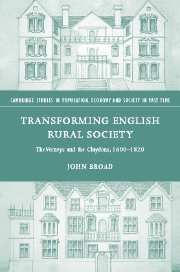Book contents
- Frontmatter
- Contents
- List of figures
- List of tables
- Preface
- Acknowledgements
- Note on editorial practice
- List of abbreviations
- 1 Introduction
- Part I Re-establishing a gentry family 1600–1657
- Part II The shaping of family and village 1657–1740
- Part III The great estate and estate communities c. 1700–1820
- 8 The rise and fall of Verney fortunes in the eighteenth century 1740–1820
- 9 Transforming the Claydons in the eighteenth century
- 10 Conclusion
- Appendix A Sir Ralph Verney's confessional letter of 1650
- Appendix B The genealogy of the Verney family
- Bibliography
- Index
10 - Conclusion
Published online by Cambridge University Press: 03 July 2009
- Frontmatter
- Contents
- List of figures
- List of tables
- Preface
- Acknowledgements
- Note on editorial practice
- List of abbreviations
- 1 Introduction
- Part I Re-establishing a gentry family 1600–1657
- Part II The shaping of family and village 1657–1740
- Part III The great estate and estate communities c. 1700–1820
- 8 The rise and fall of Verney fortunes in the eighteenth century 1740–1820
- 9 Transforming the Claydons in the eighteenth century
- 10 Conclusion
- Appendix A Sir Ralph Verney's confessional letter of 1650
- Appendix B The genealogy of the Verney family
- Bibliography
- Index
Summary
This study has looked at medium- and long-term changes in family fortunes and in rural landscape and society through a detailed case study. The many elements and linkages, and the range of themes explored encouraged an artificial subdivision into periods to ensure coherence. Although comparative studies have been drawn into the argument, it has concentrated on the internal dynamics of the Verney family and estates. What long-term trends and conclusions can be drawn from the various strands in the context of English social and rural history?
The Verney family's success in establishing themselves in the Claydons after losing most of their estates and their country seat in the first years of the seventeenth century was built on a single-minded dedication to the dynastic imperative over four generations. The heiress marriage was a vital and recurrent aspect of their aggrandisement. Four successive generations of Verneys married women with great financial assets in land or money, but without high social connections. This enabled them to build up their landed estate. But it took much more than that. Younger children, though few in number after the first generation, were never granted a substantial share of the growing wealth. When a younger son, Sir John Verney had been apprenticed to a Levant merchant, he was told to make his own way, and not to expect any landed endowment.
- Type
- Chapter
- Information
- Transforming English Rural SocietyThe Verneys and the Claydons, 1600–1820, pp. 264 - 274Publisher: Cambridge University PressPrint publication year: 2004



